初二下学期英语复习提纲
八年级下册英语总复习提纲
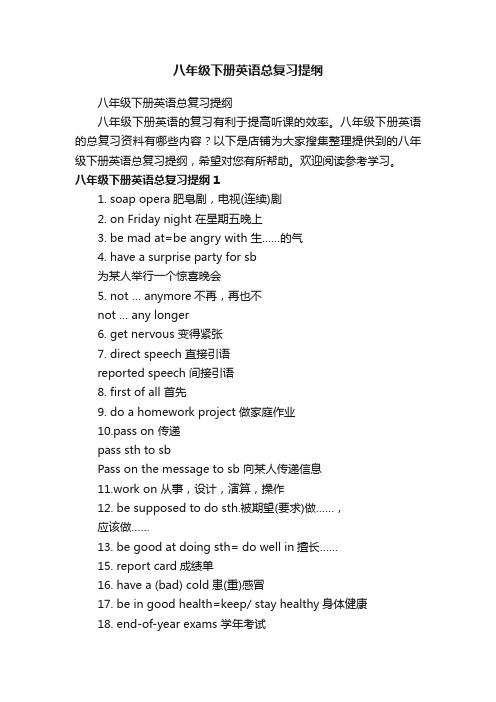
八年级下册英语总复习提纲八年级下册英语总复习提纲八年级下册英语的复习有利于提高听课的效率。
八年级下册英语的总复习资料有哪些内容?以下是店铺为大家搜集整理提供到的八年级下册英语总复习提纲,希望对您有所帮助。
欢迎阅读参考学习。
八年级下册英语总复习提纲11. soap opera肥皂剧,电视(连续)剧2. on Friday night 在星期五晚上3. be mad at=be angry with 生……的气4. have a surprise party for sb为某人举行一个惊喜晚会5. not … anymore不再,再也不not … any longer6. get nervous 变得紧张7. direct speech 直接引语reported speech 间接引语8. first of all 首先9. do a homework project 做家庭作业10.pass on 传递pass sth to sbPass on the message to sb 向某人传递信息11.work on 从事,设计,演算,操作12. be supposed to do sth.被期望(要求)做……,应该做……13. be good at doing sth= do well in擅长……15. report card成绩单16. have a (bad) cold患(重)感冒17. be in good health=keep/ stay healthy身体健康18. end-of-year exams 学年考试19. have a big fight with 和…大打一架21. forget to do sth.忘记要做某事forget doing sth.忘记做了某事22. get over克服,恢复,原谅23. a poor mountain village一个贫穷的山村24. sound like +n听起来像25. Graduate from 从……毕业26. In the mail 在邮箱里27. It's a good idea for sb to do sth某人去做某事是一个好主意28. China’s rural areas中国的偏远地区29. sea level海平面above sea level海拔30. the thin air稀薄的空气31. agree with sb./sth.同意, 与……相符(一致)32. both … and …两者都33.finish doing sth 完成做某事34. open up打开,展开,开发,揭露open up one's eyes to 开拓某人的视野到......35. a good start一个良好的开端36. care for=look after=take care of照料,照顾,计较,关心37. in danger处于危险之中38.start a bad habbit养成一个坏习惯39.copy one’s homework抄袭某人的做业40.send one’s love 问好41.find science really difficult发现科学真的很难42.make a decision to do sth=decide to do sth 决定做某事43.decide to do sth决定做某事44.there is no difference between ...and...在...和...之间没有区别45.it's just that...只不过,只是46.be over结束,完成47.in the city of......市48.a one-year program一个一年期的项目49.people who need help需要帮助的人50.something we can do for them我们能为他们做的事八年级下册英语总复习提纲21. have a great/good/nice/wonderful time=have fun = enjoy oneself 玩得高兴3.end of year party年终晚会4.take … away拿走,取走5.all the time=always一直,始终,总是6. ID card身份证7. old people’s home养老院8. make money赚钱9. around the world = all over the world 全世界,世界各地10. go to college上大学11. work hard努力工作(学习)12. a professional athlete职业运动员13. a dream job理想的.职业14. make a living (by) doing通过…谋生do sth for a living做某事谋生play sports for a living靠体育运动为生15. play sports进行体育运动= get/do exercise16. get injured受伤17. in fact事实上,实际上18. mobile phone移动电话19. too much太多(修饰不可数名词)too many太多(修饰可数名词复数)much too 太......(修饰形容词或副词)20. laugh at sb嘲笑某人21.wear jeans穿牛仔22.let sb in/out让某人进/出23.half the class一半的学生24.have a difficult time with/doing sth做某事有困难25.be famous for因….而著名26.be famous as作为…而著名27.work with与......打交道;和......一起工作28.bring sth to ... 把某物带来......29.watch a video看录像30.get an education接受教育31.The rules for.........的规则32.study for a test为考试而学习33.have a chance to do sth有一个做......的机会34.in class在课堂上35.花费相关短语的总结:sb. pay some money for sth.某人为某物花了…(钱)。
人教版八年级下册英语复习提纲(通用3篇)

人教版八年级下册英语复习提纲(通用3篇)人教版八年级下册英语复习提纲篇1语法:直接引语间接引语(一)、概念:直接引语:说话人直接引用别人的原话,引用部分要加引号。
间接引语:说话人用自己的话把别人的意思转述出来,转述部分不用引号。
(二)、转换方法(两注意,一了解):两注意:先注意人称变化,再注意时态变化;一了解:指示代词、时间状语、地点状语的变化。
l人称变化:一随主(直接引语中的第一人称应随主句中的主语变为相应的人称,但注意只改人称不变词性)e.g. He said: “I am a good student.”→He said he was a good student. (主格)He said: “My parents are teachers.”→He said his parents were teachers. (形代)二随宾(直接引语中的第二人称应随主句中的宾语变为相应的人称,同样只改人称不变词性)e.g. He said (to me): “ You have to go there.” →He said I had to go there.(主格)He said (to me): “Your brother has to go there.”→He said my brother had to go there.(宾格)三不变(直接引语中的第三人称不需要改变)e.g. He said: “ He swims every day.”→He said he swam every day.l时态变化,按下表进行改变直接引语间接引语一般现在时一般过去时(客观真理除外,仍用现在时)现在进行时过去进行时现在完成时过去完成时一般过去时过去完成时过去完成时过去完时一般将来时过将来时一了解:指示代词、时间状语、地点状语可以不变,也可按以下规则进行变化:直接引语间接引语指示代词this这these这些that那those那些时间状语now现在then那时today今天that day那天tonight今晚that night那天晚上this week这星期that week那个星期yesterday昨天the day before前一天last week上星期the week before前一个星期ago以前before以前tomorrow明天the next/following day第二天next week下星期the next week第二个星期地点状语here这里there那里动词come来go去(三)、注意以下几种句型,它们在直接引语变间接引时,除了遵循以上人称和时态的变化外,还有一些特殊的要求:1.直接引语为陈述句,完全遵循以上方法;2.直接引语为一般疑问句、选择疑问句或反义疑问句时,先用“if”或“whether”来引出从句,再把从句写成一个陈述句。
初二下学期英语复习提纲
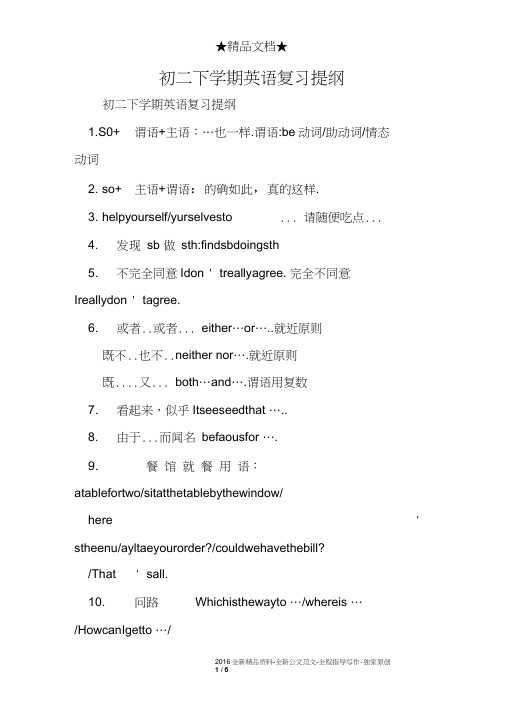
★精品文档★初二下学期英语复习提纲初二下学期英语复习提纲1.S0+ 谓语+主语:…也一样.谓语:be动词/助动词/情态动词2. so+ 主语+谓语:的确如此,真的这样.3. helpyourself/yurselvesto ... 请随便吃点...4. 发现sb 做sth:findsbdoingsth5. 不完全同意Idon ' treallyagree. 完全不同意Ireallydon ' tagree.6. 或者..或者... either…or…..就近原则既不..也不..neither nor….就近原则既....又... both…and….谓语用复数7. 看起来,似乎Itseeseedthat …..8. 由于...而闻名befaousfor ….9. 餐馆就餐用语:atablefortwo/sitatthetablebythewindow/here ' stheenu/ayltaeyourorder?/couldwehavethebill?/That ' sall.10. 问路Whichisthewayto …/whereis …/HowcanIgetto …/2016全新精品资料-全新公文范文-全程指导写作-独家原创1 / 6Istherea..nearhere/canyoutellethewayto …/¥尅兀曾耿¥2016全新精品资料-全新公文范文-全程指导写作-独家原创3 / 69/乙冏團省阱 助亘昔畀畐寿-胃」!肛=|冋o[s 」!j 辛貝 写乙lueo/eiHeqHeisntue 屮胃付中乙lsone6qs/tso|eqqs/AeMS < qsesoi 翱躱 £乙 QAup/ieM < setnuieAy :畐脚砸竈/马爭阴曲岳圧•乙乙 影昜… 」OHQMJ 乙AeM6uo|eeiinbs代q 丄二… ojj(AeMe)jej(sg)s < II 咚惡驳脚 02回呦…丄蚤■p ueeqjqoeejnoA|!junuoo6=pueeqjojpeojsiqjdno6£L e6puqeqissojo=e6puqeqissojoeo6 詛国 •乙.Wd 」」noAuo6u!SSOJopj!MieMieei =聊孚丹口脚& £ 骂sjqBiioyjeJvBuissojopjiqjeqHejqBuujnv [[OHe6ueo|Moqe||ejnoAueooAoieilAjioBiqe-9 乙ins > qs •屮sopo[+ 回闻+qseeni!M/oovseewr6L -宙泄丑寵也 ejeqteqAej!=ejeqjsn!eqAeg [pequi/iejidsoqupiseqz Lc 丄乡号 g|qno 」e 屮sjeqM=<j /6uojMS < jeqM=<j /jeweeqjs < jeqM'gi ,丁脚/出驳阴…辛qs 丑••••O S EMS < qsuo gi ,映歌丑 」eujoojeejjseque I ,Df¥尅兀曾耿¥★精品文档★'seasy/interesting/iportant/(forsb)todosth. (对sb 来说)做sth 是容易的/有趣的/重要的.28.if 条件状语从句:从句一般现在时,主句一般将来 时。
八年级英语下册知识点复习提纲三篇
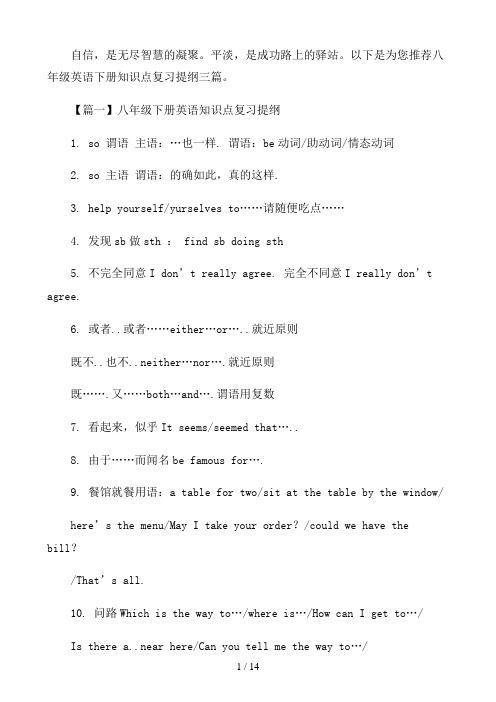
自信,是无尽智慧的凝聚。
平淡,是成功路上的驿站。
以下是为您推荐八年级英语下册知识点复习提纲三篇。
【篇一】八年级下册英语知识点复习提纲1. so 谓语主语:…也一样. 谓语:be动词/助动词/情态动词2. so 主语谓语:的确如此,真的这样.3. help yourself/yurselves to……请随便吃点……4. 发现sb做sth : find sb doing sth5. 不完全同意I don’t really agree. 完全不同意I really don’t agree.6. 或者..或者……either…or…..就近原则既不..也不..neither…nor….就近原则既…….又……both…and….谓语用复数7. 看起来,似乎It seems/seemed that…..8. 由于……而闻名be famous for….9. 餐馆就餐用语:a table for two/sit at the table by the window/here’s the menu/May I take your ord er?/could we have thebill?/That’s all.10. 问路Which is the way to…/where is…/How can I get to…/Is there a..near here/Can you tell me the way to…/Can you tell me how I can get to…?11. turn right at the third crossing/traffic lights在第3个路口往右拐=take the third crossing on your right12. 过桥go across the bridge=cross the bridge13. 走到路的尽头go up this road to the end=go on until you reach the end.14. at the street corner在街角15. on sb’s way to….在sb去…的途中/路上16. what’s the matter?=what’s wrong?=w hat’s the trouble?怎么了?17. be sick in hospital/in bed 生病住院/卧床18. Maybe it is there=it may be there可能在那里.19. It takes/took/will take sb 时间 to do sth. Sb做sth花费了…时间20. 路途遥远It’s (5 kms)far(away)from…=That’s quite a long way.21. wait for…等待22. 五分钟的步行/驾驶路程:five minutes’ walk/drive23. 迷路lose sb’s way/sb be lost/sb get lost24. just then=just at that time/moment就在那时25. 首先first of all=at first26. a big city like Tokyo像东京这样的大城市27. It’s easy/interesting/important/ (for sb) to do sth.(对sb来说)做sth是容易的/有趣的/重要的.28. if 条件状语从句:从句一般现在时,主句一般将来时。
八年级下册英语期末复习提纲
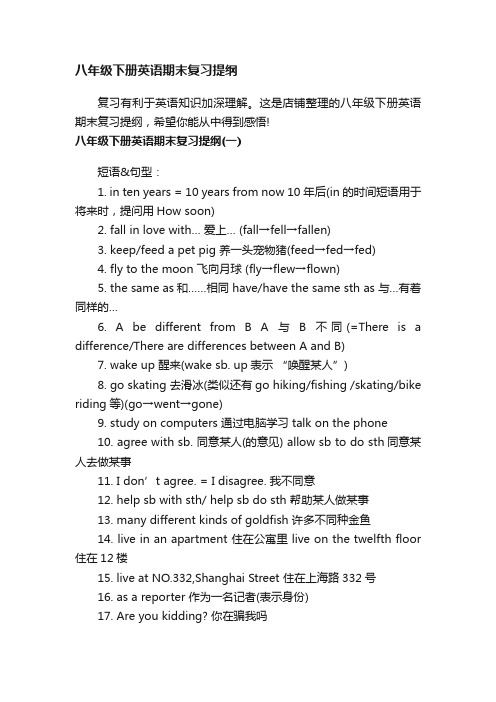
八年级下册英语期末复习提纲复习有利于英语知识加深理解。
这是店铺整理的八年级下册英语期末复习提纲,希望你能从中得到感悟!八年级下册英语期末复习提纲(一)短语&句型:1. in ten years = 10 years from now 10年后(in的时间短语用于将来时,提问用How soon)2. fall in love with… 爱上… (fall→fell→fallen)3. keep/feed a pet pig 养一头宠物猪(feed→fed→fed)4. fly to the moon 飞向月球(fly→flew→flown)5. the same as和……相同 have/have the same sth as 与…有着同样的…6. A be different from B A与B不同(=There is a difference/There are differences between A and B)7. wake up 醒来(wake sb. up表示“唤醒某人”)8. go skating 去滑冰(类似还有go hiking/fishing /skating/bike riding等)(go→went→gone)9. study on computers 通过电脑学习 talk on the phone10. agree with sb. 同意某人(的意见) allow sb to do sth同意某人去做某事11. I don’t agree. = I disagree. 我不同意12. help sb with sth/ help sb do sth 帮助某人做某事13. many different kinds of goldfish 许多不同种金鱼14. live in an apartment 住在公寓里 live on the twelfth floor 住在12楼15. live at NO.332,Shanghai Street 住在上海路332号16. as a reporter 作为一名记者(表示身份)17. Are you kidding? 你在骗我吗18. in the future 在将来/在未来19. no more=not …any more不再(强调动作不再发生)no longer=not… any longer不再(强调状态不再发生)20. be able to与can 能、会l (be able to用于各种时态,而can只能用于一般现在时态和一般过去时态中;have to用于各种时态,而must只能用于一般现在时态)e.g. 1.I have been able to/will be able to speak two languages. (不可以用can)2. will have to/ had to stay at home. (不可以用must)21. come true 实现(不及物动词), make sth come true 使…实现e.g. My dream has come true. 我的梦想已经实现了I have made my dream come true. 我已经实现了我的梦想。
八年级下学期英语复习提纲
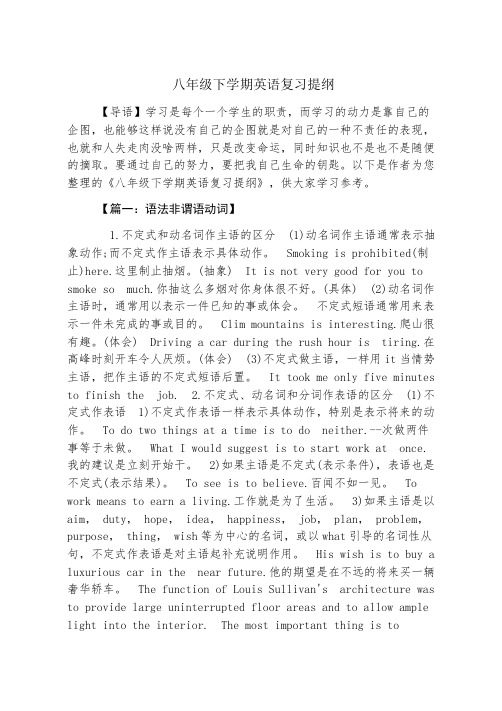
八年级下学期英语复习提纲【导语】学习是每个一个学生的职责,而学习的动力是靠自己的企图,也能够这样说没有自己的企图就是对自己的一种不责任的表现,也就和人失走肉没啥两样,只是改变命运,同时知识也不是也不是随便的摘取。
要通过自己的努力,要把我自己生命的钥匙。
以下是作者为您整理的《八年级下学期英语复习提纲》,供大家学习参考。
【篇一:语法非谓语动词】1.不定式和动名词作主语的区分 (1)动名词作主语通常表示抽象动作;而不定式作主语表示具体动作。
Smoking is prohibited(制止)here.这里制止抽烟。
(抽象) It is not very good for you to smoke so much.你抽这么多烟对你身体很不好。
(具体) (2)动名词作主语时,通常用以表示一件已知的事或体会。
不定式短语通常用来表示一件未完成的事或目的。
Clim mountains is interesting.爬山很有趣。
(体会) Driving a car during the rush hour is tiring.在高峰时刻开车令人厌烦。
(体会) (3)不定式做主语,一样用it当情势主语,把作主语的不定式短语后置。
It took me only five minutes to finish the job.2.不定式、动名词和分词作表语的区分 (1)不定式作表语 1)不定式作表语一样表示具体动作,特别是表示将来的动作。
To do two things at a time is to do neither.--次做两件事等于未做。
What I would suggest is to start work at once.我的建议是立刻开始干。
2)如果主语是不定式(表示条件),表语也是不定式(表示结果)。
To see is to believe.百闻不如一见。
To work means to earn a living.工作就是为了生活。
八年级英语下册知识点复习提纲三篇
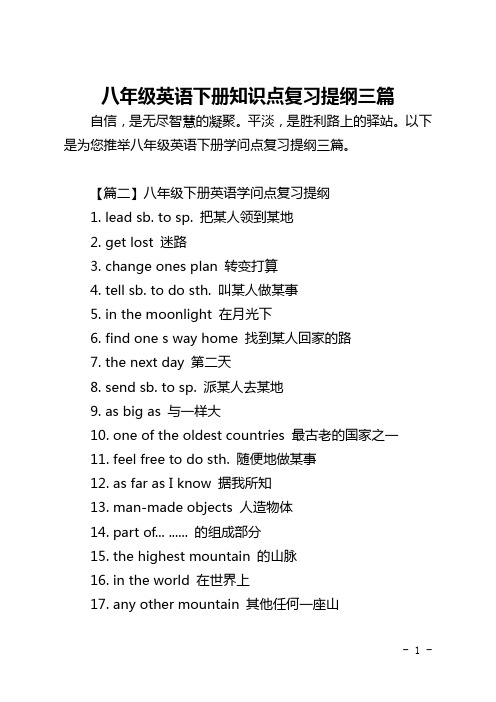
八年级英语下册知识点复习提纲三篇自信,是无尽智慧的凝聚。
平淡,是胜利路上的驿站。
以下是为您推举八年级英语下册学问点复习提纲三篇。
【篇二】八年级下册英语学问点复习提纲1. lead sb. to sp. 把某人领到某地2. get lost 迷路3. change ones plan 转变打算4. tell sb. to do sth. 叫某人做某事5. in the moonlight 在月光下6. find one s way home 找到某人回家的路7. the next day 第二天8. send sb. to sp. 派某人去某地9. as big as 与一样大10. one of the oldest countries 最古老的国家之一11. feel free to do sth. 随便地做某事12. as far as I know 据我所知13. man-made objects 人造物体14. part of... ...... 的组成部分15. the highest mountain 的山脉16. in the world 在世界上17. any other mountain 其他任何一座山18. of all the salt lakes 在全部的咸水湖中19. run along 跨越20. freezing weather 冰冻的天气21. take in air 呼吸空气22. the first people to do sth. 第一个做某事的人23. in the face of difficulties 面临危急24. give up doing sth. 放弃做某事25. achieve one s dream 实现某人的幻想26. the forces of nature 自然界的力量27. reach the top 到达顶峰28. even though 虽然;尽管29. at birth 在出生的时候30. be awake 醒着31. run over with excitement 兴奋地跑过去32. walk into sb. 撞到某人33. fall over 摔倒34. take care of 照看;照料35. every two years 每两年36. cut down the forests 砍伐林木37. endangered animals 濒危动物38. fewer and fewer pandas 大熊猫越来越少39. be in danger 处于危急之中40. the importance of saving these animals挽救这些动物的重要性【篇三】八年级下册英语学问点复习提纲Unit1【短语归纳】1.too much太多2.lie down躺下3.see a dentist看牙医4.get an X-ray做个X光检查5.take ones temperature量体温6.put some medicine on在上敷药7.have a fever发烧8.play computer games玩电脑游戏9.all weekend整个周末10.take breaks/take a break休息11 without thinking twice没多想12 go to doctor看医13.get off下车14.take sb.to the hospital送某人去医院15.wait for等待16.to ones surprise使惊异的;17.thanks to多亏;由于18.in time准时19.think about考虑20.have a heart problem患有心脏病21.get to到达22.right away立即;马上23.get into trouble造成麻烦〔或苦恼〕24.do the right thing做正确的事25.fall down摔倒26.play soccer踢足球27.puton sth.把放在某物上28.a few几个;少数29 e in进来30.get hit/sunburned被打击/晒伤31.be interested in对感兴趣32.be used to习惯于33.because of因为34.take risks/take a risk冒险35.lose ones life失去生命36.run out〔of〕用完;耗尽37.cut off切除38.get out of离开;从出来39.make a decision/decisions做确定40.be in control of掌管;管理41.think about考虑42.give up放弃43.go mountain climbing去爬山【用法集萃】1.need to do sth.需要去做某事2.see sb. Doing sth.观察某人正在做某事3.ask sb.sth.询问某人某事4.expect sb.〔to〕do sth.期望某人做某事5.agree to do sth.同意做某事6.help sb.〔to〕do sth.关心某人做某事7.want to do sth.想要做某事8.tell sb. to do sth.告知某人去做某事9.have problem〔in〕doing sth.10.be/get used to doing sth.习惯做某事e sth. to do sth.用某物去做某事12.seem to do sth.似乎做某事13.keep on doing sth.继续做某事14.mind doing sth.介意做某事Unit2【短语归纳】1.clean up清扫〔或去除〕洁净2.cheer up〔使〕变得高兴起来;振奋起来3.give out分发ed to曾经;过去5.give away赠送;捐赠6.set up建起;设立7.make a difference影响;有作用8 e up with想出9.put off推延10.put up张贴11.call up打电话给12.help out关心摆脱困难13.care for照看;照看14.give up放弃15.try out for参与选拔16 e true实现17.run out of用光18.take after与相像19.fix up修理20.be similar to与相像【用法集萃】1.need to do sth.需要做某事2.make plans to do sth.制定打算做某事3.ask sb.〔not〕to do sth.要求某人不要做某事ed to do sth.过去经常做某事5.give up+时间+to do sth.放弃时间去做某事6.get a feeling of有感觉7.decide to do sth.确定做某事8.help sb.〔to〕do sth.关心某人做某事9.make a difference to对产生影响10.make it possible for sb.to do sth.使得做某事对某人来说是可能的Unit3【短语归纳】1.do the dishes洗餐具2.take out the rubbish倒垃圾3.go out出去4.stay out待在外面;不在家5.help out关心完做某事6.at least至少7.throw down扔下8.all the time频繁;反复9.in surprise惊异地10.as soon as一就11.spendon在花费〔金钱或时间〕12.in oder to为了13.provide sth. for sb.向某人提供某物14.depend on依靠;信任15.look after照看;照看16.get into进入17.keep it clean and tidy保持它洁净和干净18.take care of照看19.as a result结果【用法集萃】1.finish doing sth.做完某事2.want sb. to do sth.想要某人做某事3.try〔not〕to do sth.尽力〔不〕做某事4.let sb. do sth.让某人做某事5.spend〔in〕doing sth.花费做某事6.mind doing sth.介意做某事7.learn to do sth.学会做某事8.learn how to do sth.学会怎样做某事9.the+比较级,the+比较级越,就越Unit4【短语归纳】1.too much太多〔修饰不行数名词〕2.too many〔修饰可数名词〕3.hang out闲逛4.get into a fight争吵5.go to sleep去睡觉6.call sb.〔up〕给某人打电话7.be good at擅长8.talk about谈论9.on the phone在电话中10.look through扫瞄;翻阅;认真检查11.give back归还12.be angry with sb.生某人的气13.a big deal重要的事14.no problem没问题15.work out解决;算出16.get on with sb.与某人和谐相处17.feel lonely感到孤独18 municate with sb.与某人沟通19.in future今后;从今以后20.next time下次21.make friends交伴侣22.be worried about担忧23.be afraid of可怕24.in front of在前面25.notany more不再26.play sports做运动27 pete with sb.与某人竞争28.so much/many那么29.have lessons上课30.go shopping去购物31.cut out删除;删去32.a few几个;少数33.all kinds of各种各样的34 parewith比较;对比35.agree with sb.同意某人〔的想法〕36.in ones opinion依看37.something quiet一些清静的事38.turn down调小【用法集萃】1.allow sb.to do sth.同意某人做某事2.Why dont you do sth.你为什么不做某事呢?3.want to do sth.想要做某事4.find sb. doing sth.发觉某人正在做某事5.tell sb.to do sth.告知某人做某事6.refuse to do sth.拒绝做某事7.let sb.do sth让某人做某事8.offer to do sth.主动提出做某事9.mind sb.doing sth.介意某人做某事10.notuntil直到才11.want sb.to do sth.想要某人做某事12.Its time for sth.该做某事了13.Its+adj.+to do sth.做某事是的14.keep on doing继续做15.What do you think of?你认为怎么样? Unit5【短语归纳】1.wait for等候2.look for查找3.go off〔闹钟〕发出响声4.take a shower洗澡;淋浴5.pick up接电话6.make sure务必;确保7.have fun玩得快乐8.fall asleep入睡;睡着9.die down渐渐变弱;渐渐消逝10.wake up醒来;叫醒11.in a mess凌乱不堪;乱七八糟12.clean up清扫洁净;整理13.in times of difficulty在困难时期14.take photos拍照;照相15.play the piano弹钢琴16.turn on打开17.listen to the radio听收音机18.right away立即;马上19.get to到达20.have a look看21.because of因为22.make ones way行走;前进23.in silence静默地;无声地24.take down摧毁;拆卸;记下25.tell the truth说实话26.point out指出27.go away消逝;离开28.as well也29.three times a week一周三次30.call out喊出【用法集萃】1.be busy doing sth.忙着做某事2see sb./sth. doing sth.观察某人或某物正在做事3.begin/start to do sth.开始做某事4.try to do sth.努力去做某事5.Its+adj.+to do sth.做某事是的6 have trouble〔in〕doing sth.做某事是有困难的Unit6【短语归纳】1.work in 从事2.as soon as 一就3.take away 拿走,带走4.a good way to solve his problem解决他的问题的好方法5.a little bit 有点儿6.give up 放弃7.seem very possible 好像有可能8.agree with sb 赞同某人9.different opinions 不同的观点10.the main character 主要人物11.once upon a time 从前12.at other times 平常;有时13.make 72 changes 做出72种改变14.turninto 变成15.hide his tail 隐藏它的尾巴16 e out 出现;出版;结果是17.the weak 弱者18.make a dress 做衣服19.fall in love with sb 爱上某人20.get married 结婚21.open up 打开22.be born 出生23.think of ways 想出方法24.all over the world 全世界25.sound stupid 听起来愚蠢26.in the forest 在森林里27.the whole family 整个家庭28.make a plan 制定一个打算29.be quiet 清静30.go to sleep 去睡觉31.get up 起床32.along the way 沿路33.be lost 迷路34.wake up 醒来35.go out 出去36.pieces of bread 面包片37.never mind 没关系38.findout 找出39.inside the house 在房子里面40.learn about 了解41.because of 因为【用法集萃】1.try to do sth 设法做某事2.finish doing sth 完成做某事3.continue to do sth 继续做某事4.make sb do sth 让某人做某事5.keep doing sth 始终做某事6.instead of doing sth 代替做某事7.be able to do sth 能够做某事8.become interested in doing sth 对做某事感兴趣9.a new TV program called Monkey被称为《美猴王》的新电视节目10.It take/took some time to do sth花费多少时间做某事11.have no time to do sth 没时间做某事12.cant stop doing 禁不住做某事13.hear sb doing sth 听见某人正在做某事14.lead sb to someplace 带着某人去某地15.leave sth at/in someplace 把某物遗忘在某地16.show sb sth 向某人展示某物17.love doing sth 喜爱做某事Unit7【短语归纳】1.take in 吸入;吞入〔体内〕2.in the face of 面对〔问题,困难等〕3.at birth 出生时4.talk about 谈论5.as you can see 正如你所看到的6.as far as I know 据我所知7.mountain climbing 登山8.give up 放弃9.upto 直到10.prepare for 为预备11.walk into 撞到12.fall over 摔倒13.take care of 照看;照看14.die from 死于15.cut down 砍倒16.or so 大约,左右17.in the future 将来18.because of 因为19.in danger 处于危急之中【用法集萃】1.any other +名词复数其他任何一个2.Feel free to ask sb sth on 就随便问某人某事3.one of+形容词级+可数名词复数最之一4.whats the + 形容词级+ in the world ? 世界上最是什么?5.How high is ? 有多高6.protectfrom/against爱护使不受,防范7.succeed in doing sth 胜利做某事8.spend doing 花费做某事9.There be sb/sth doing 有某人/物正在做某事10.teach sb about sth 教某人有关内容11.send sb to do sth 派某人去做某事Unit 8【短语归纳】1.go out to sea 出海2.full of 充满3.grow up 长大4.putdown 放下;记下5.on page 50 在50页6.at least 至少7.hurry up 赶快8.on the island 在岛上9.have nothing 什么也没有10.bring back to sp 带回到某地11.give up 放弃12.wait for 等待13.cut down trees 砍树14.the marks of 的痕迹15.on the sand 在沙子上16.not long after that 之后不久17.a broken ship 一艘坏船18.a piece of land 一块陆地19.in the middle of the sea 在海的中间20.leave behind 遗忘;留下21.go to the movies/see the film 看电影22.more than 超出23.a bit boring 有点儿无聊24.fight over 与争吵;争斗25.full of feelings 充满感情26.on the radio 通过收音机27.think about 考虑28 e to realize 渐渐意识到29.ever since then 从那时起30.a kind of 一种31.such as 例如32.the importance of money and success 金钱和胜利的重要性33.belong to 属于34.each other/one another 彼此35.do some research 做一些讨论36.become famous 变得知名37.find out 找出;查出38.at the end of the day 在一天结束的时候【用法集萃】1.finish doing sth 完成某事2.arrive at/in sp 到达某地3.learn to do sth 学习/学会做某事4.see sa doing sth 观察某人正在做某事5.help sb do sth 关心某人做某事 sb sth 给某人取名为7.teach sb sth 教某人某事e sth to do sth 用某物做某事9.love to do/doing sth 喜爱做某事10.be interested in sth/doing sth 对某事/做某事感兴趣11.cant wait to do sth 迫不及待做某事ed to do sth 过去经常做某事13.be kind to sb 对某人友好14.Its + n + to do 做某事是的15.one of the + 形容词级+名词复数最之一16.hope to do sth 盼望做某事17.have time to do sth 有时间做某事。
英语八年级下册复习大纲.doc

八年级下册复习大纲Unit 5 topic 11. You look excited ・2.1 feel disappointed.3. It tastes so delicious.4. The boy seems worried.5. It smells terrible.6. Did she sound upset?7. She was veiy sad and went mad.8. The father was lonely and often became angry because of the noisy children.9. How are you doing? Very well, thank you.1. She feels very lonely because she has no friends to talk with.2. Tm feeling really sad because I failed the English exam.5. Maria is not as/so brave as Helen.7. What seems to be the problem?8・ Thanks you for telling me. 9. Everyone gets these feelings at your age.10. There, there! It'll be OK. 11. How time flies!12. Don't be afraid. Follow the dentist's advice. Topic31.1( makes me feel nervous. 3. Your classmates make you monitor.5. Wearing red often makes me active. 2. Let^s give Michael a surprise!4. Let's prepare for that. 6・ The doctor let Michael rest for a few days. 7. How long have you felt like this? One day. 8. I hate to go to the hospital. 10.1 hope so. 11. Good night! 13. Hope you get well soon. 9. Be brave!12. Fm afraid we have to go now.14. Fm so sorry about your illness, but it can" be SARS. 15・ Follow the doctor's advice, and youUl get well soon.Unit 6 topiclLI have some exciting news to tell you! 2. But it will take us a few days to get there by bike.3. Helen, your task is to find out the cost by bus.4.1 want to make a room reservation.5. Miss Wang told us not to ask our parents for the money ・6. Why don't we put on a show to raise money?7. Kangkang helped us (to) book the train tickets.& Its hard to say. 9. Let's find out some information about the cost ・10. My pleasure. 11. Have a good trip!12. May I have your name and telephone number, please?13. Some schools come up with great ideas, such as “ King or Queen for a Day :14. I'm looking forward to hearing from you.Topic 21. While you were enjoying your trip, I was busy preparing for my exams.2. When he arrives, I'd like you to meet him.3・ Before he comes, would you help me make a plan to explore Beijing?4. As they were exploring happily, the crowed of people became larger and large 匚10. Guess what?12. Why all the smiling faces?14. Just set three places ・16.1 hope everything goes well. 11. Please say thanks to your mom. 13. How nice! 15. Michael isn't able to come ・ 17. Til ring up Michael later.Topic 23. I live as happily as before.4. Helen is as lovely as Maria. 6. Anything wrong?5. He didn\ raise his head until someone called him.6. As soon as the three boys saw each other, they all jumped up and down happily.7. Then we rode to the Ming Tombs after we checked our bikes and backpacks ・18. They walked through the passage into Dingling and were surprised at the wonders. Topic 31 ・ If people obey the traffic rules, there will be fewer accidents.2. If we ride at night, we should have lights on the bicycle or wear light-colored clothes.3. If we break the traffic rules, we will get a fine and even be in dange 匚4. Whe n 1 first arrived, I was afraid of riding my bike any where •5. It\ easy to park bikes, too.6. To avoid hitting the truck, he ran into the wall and his arm was badly hurt.7. However, his path to success wasn't smooth.8. It seems impossible to beat his seven-time record ・1. You look so excited.你看起来很激动。
八下英语复习提纲

八下英语复习提纲一、单元复习1. Unit 1: How do you study for a test?- Vocabulary: words related to studying and learning- Grammar: adverbs of frequency, question words, present simple vs present continuous- Conversation: talking about studying habits, giving advice2. Unit 2: I used to be afraid of the dark.- Vocabulary: adjectives to describe personal experiences, phrasal verbs- Grammar: used to, be used to, would for past habits- Conversation: talking about past experiences, sharing childhood stories3. Unit 3: Teenagers should be allowed to choose their own clothes.- Vocabulary: words related to rules and regulations, clothing- Grammar: modal verbs (should, shouldn't, must, mustn't)- Conversation: discussing rules and opinions, expressing agreement and disagreement4. Unit 4: What would you do?- Vocabulary: words related to volunteering, charity work- Grammar: conditional sentences (type 1 and type 2)- Conversation: talking about hypothetical situations, making suggestions5. Unit 5: Nelson Mandela - a modern hero- Vocabulary: words related to heroism, apartheid, human rights- Grammar: passive voice, reported speech- Conversation: discussing heroes and their qualities, reporting statements6. Unit 6: I'm going to study computer science.- Vocabulary: words related to future careers, job skills- Grammar: be going to, will for future plans- Conversation: talking about future plans and ambitions, asking for advice7. Unit 7: Will people have robots in their homes?- Vocabulary: words related to technology and the future- Grammar: future perfect tense, future continuous tense- Conversation: discussing predictions and possibilities, expressing hopes andfears8. Unit 8: How do you make a banana milkshake?- Vocabulary: words related to recipes and cooking- Grammar: imperative sentences, linking words- Conversation: giving instructions, talking about favorite recipes二、语法复习1. Present simple vs present continuous- Present simple: used for habitual actions, general truths, schedules- Present continuous: used for actions happening at the moment of speaking, temporary situations2. Adverbs of frequency- Used to describe how often something happens (e.g. always, usually, sometimes)3. Question words- Used to ask specific information (e.g. what, where, when, why, how)4. Used to, be used to, would for past habits- Used to describe past habits or situations that are not true anymore- Be used to: used to describe being familiar with something- Would: used to describe repeated past actions or habits5. Modal verbs (should, shouldn't, must, mustn't)- Used to express obligations, suggestions, and rules6. Conditional sentences (type 1 and type 2)- Type 1: used to describe real or possible future situations- Type 2: used to describe hypothetical or unreal present situations7. Passive voice- Used to focus on the action rather than the doer of the action8. Reported speech- Used to report what someone said in the past9. Be going to vs will for future plans- Be going to: used for planned future actions or intentions- Will: used for spontaneous future actions or predictions10. Future perfect tense, future continuous tense- Future perfect tense: used to describe an action completed in the future before another action or time- Future continuous tense: used to describe ongoing or continuous actions in the future三、听力技巧1. Listen for keywords and main ideas- Pay attention to important words or phrases related to the topic2. Use context clues- Pay attention to the surrounding sentences or phrases to understand the meaning of unknown words or phrases3. Predict possible answers- Use your knowledge of the topic or the context to predict possible answers before listening to the options4. Take notes while listening- Write down key points or important information as you listen to help remember details5. Practice listening regularly- Improve your listening skills by listening to English audio materials, such as podcasts or songs, on a regular basis四、阅读技巧1. Skim the text before reading- Quickly read through the text to get a general idea of the topic and organization2. Scan for specific information- Look for keywords or phrases to quickly find the answer to a specific question3. Pay attention to the structure of the text- Look for headings, subheadings, or bullet points to understand theorganization of the text4. Guess the meaning of unfamiliar words- Use context clues or familiar word parts to guess the meaning of unknown words5. Summarize the main points- After reading, summarize the main points or ideas of the text in your own words五、写作技巧1. Plan and organize your ideas- Before writing, make an outline or plan for your essay or composition2. Use appropriate vocabulary and grammar- Use a variety of vocabulary and grammatical structures to express your ideas3. Include relevant examples and details- Support your arguments or ideas with specific examples and details4. Proofread and revise your writing- Check for errors in grammar, spelling, and punctuation before submitting or finalizing your writing5. Practice writing regularly- Improve your writing skills by practicing writing different types of texts, such as essays, articles, or letters。
八年级下册英语复习提纲

八年级下册英语复习纲要Unit 1Useful Expressions1. make predictions做展望2. free time安闲时间3.flyto乘坐飞往4. on a space station 在太空站上5. I disagree. 我不一样意 .6. fall/be in love with sb. 与 sb. 相爱7. keep pets 养宠物8. be able to 能够9. predict the future 展望未来10. come true 实现11.see sb. do sth. 看见 sb. 做某事 ( 的全过程 ) doing sth. 看见 sb. 正在做某事 ( 片断 )12. help sb. with sth. 帮助某人做某事13. hundreds of 数以百计的14. try to do sth. 全力做某事15. look like 看上去长的像16. look for找寻17.一段时间 + from now ( 从此刻起 ) 以后from now on = in the future此后Key Points1. Do you think ?I think (that) .I don ’t think (that).2. study at home on computer辨析: on,in 和 with.on:表示使用通信工具、信息或传媒,乘坐交通工具等;in :使用语言文字等媒介 ;with :借助详细的手段或工具。
Eg. I don’t want to talk about it on the phone.Can you speak it in English?Don’t write it with a red pen.3. Will people use money in 100 years?“in+ 时间”构造常与一般未来时连用,对其进行发问时用特别疑问词 how soon.4. beforeago 与过去时连用Grammar Focus1. The Simple Future tense一般未来时的三种基本构造:⑴will +V.⑵be going to +V.⑶be + Ving一般未来时的时间状语:in +时间,in the future,next +时间,与 tomorrow 有关的时间, this + 时间, from now on ,right now ,some day2.形容词、副词的比较级用法Unit 2UE1. argue with sb.与某人争执about/over sth.为某事争执2. out of style/danger过时/离开险境in style/danger 时髦 / 处于危险之中3. call up sb. ( 代词放中间) 给某人打电话4. keep out 不让进入5. What ’s wrong? 怎么啦 ?6. be surprised at 对感觉惊讶7. borrow sth. from sb. 从某人那边借入某物8. need to do sth. ( 某人 ) 需要做某事doing sth. ( 某物 ) 需要做某事9. payfor sth. 为某物付 ( 钱)10. the same + n. + as 与相同的 n.11. get on well with sb. 与某人相处和睦12. have a fight with sb. 与某人争执13. take part in加入14. plan sth. for sb. 为某人计划某事15. as much as possible 尽可能多的KP.1. Sb. payfor sth. 某人为某物花了钱。
初二下学期英语复习提纲

初二下学期英语复习提纲1 、宾语从句:如果一个句子作为动词或介词的宾语,称为宾语从句。
(1)如果一个特殊疑问句作某个动词或介词的宾语,一定要用其陈述的语序。
如:they often ask him where he is from.. 不能说成:they often ask him where is he from.(2)某些特殊疑问句作宾语可以简写成“特殊疑问句+to do” 的形式。
例如:i am thinking about what to say < what i should say.> 我正在考虑我该说点儿什么。
练习:一,选择题;( )1,Thanks a lot for me about it.a. to tellb. tellc. tellingd. told( )2.Best wishes your birthday.a. forb. toc. ond. in( )3.In England, people usually call James Jim .a. shortlyb. for shortc. easyd. easily( )4. Mother with her three children going shopping.a. areb. isc. willd. were( )5. March 8 th isa. the women’s dayb. the woman’s dayc. women’s dayd.women’ day二,改错题:()1.Every here like English very much.( )2.Mr Wu is going to want me to give a talk.( )3.In England, you never can’t put their family name first.( )4.I don’t know why do people call me Jim.( )5.I’d like to buy something for Mr Wu in teacher’s day.三、单项选择:()1.Best wishes teacher’s day.a. tob. forc. ofd. with( )2.Thank you for English fun.a. makeb. to make c .makes d. making( )3.In England , people never use the first name their family name.a.before.b.in front ofc.withd.after( )4.The teacher didn’t teach us in the last lesson.a.new anything b,new something c.anything new d.something new ( )5.Everyone is here. nobody isa. not away b, away c. not out d. go( )6.His friends call Jim short.a. he, forb. him, forc. him, ind. her ,for( )7.Would you like to give us a ?a .talkingb .talk c. to talk d. talks( )e to my office after school, Tom. L et’s a talk about your lessons.a. haveb. having c to have d had( )9.----Hi, Tom. how is your father? -----oh,a. he is not tallb. he doesn’t feel wellc.he is oldd. he is a teacher( )10.David William Lewis is called when we meet him for the first time.a. Daveb. Davidc. Mr. Lewisd. Mr. Willian( )11.Rober Thomas Brown is my very good friend, so I usually call hima. Mr Brownb. Rober Brown c Bob d. Mr Robert( )12. something about your family, ok?a. Sayb. Tellc. Speakd. Talk( )13.You can call me Bob, you should never call me Mr Bob.a. but b .or c. and d./( )14.In China, the first name is name. That’s different English name.a .family, with b. given, from c. family, from d. given ,with( )15,I’m very glad the news.a. hearb. to hearc. listen d . listening( ) 16.What about to the great wall hotel ?a. gob. to goc. goesd. going2. 一般将来时: be going to 结构的用法:(1) 用be going to+ 动词原形表示” 将要发生的事情或主观上打算, 计划, 决定要做的事 . 其后的时间状语通常为表示短期或近期含义的短语或表示固定时间的从句 . 如:tomorrow morning,/tomorrow afternoon /tomorrow evening, next month /next week /next year /next Saturday, this week/year/afternoon/Saturday. 或者when you grow up---------? 等等(2) be going to 结构中,be 是助动词, 要按句中主语的人称和数的变化而变化 . 其后要接动词的原形 . 该句的否定式是在be 后面加not, 其疑问式将be 提到句首 . 如:She is going to help her mother clean the house this Sunday./We are going to watch TV tomorrow evening. /Are they going to have a sports meeting next month.? /There is going to be an English call tomorrow afternoon..(3), 在英语中, 表示位置转移的动词, 如:come, go, fly, drive, leave, stay, 等, 可用现在进行时表示按计划或安排即将发生的事, 不必用be going to结构 . 如:She is flying to Nanjing herself. 明天她一个人飞往南京 . Are you driving home ? 你开车回家吗?练习:单项选择题:()1.What are you going to do Friday evening ?a. inb. onc. at d of( )2.Do you have to do every day ?a. much workb. many workc. much worksd. many works( )3.What about meat for supper ?a. to buy someb. to buy anyc. buying somed. buying any( )4. Ann her hair this Saturday .a. washb. washesc. to washd. is going to wash( )5.My school is near. I like walking there.a. toob. quitec. quietd. so( )6. These new shoes are for .a.you and Ib.I and youc.you and med.me and you( )7. would you like boating ?a.gob.to goc.goingd.to go to( )8. Why not there by bus ?a.to gob.goesc. go d .going( )9. Are you free next Ssaturday ? .a.Sureb. I think so c .Nothing much d.Why( )10.Is Li Ming good singing ?a.atb.inc.ond. for( )11.I have some books .a. readb. readingc. to readd. to reading( )12.Are you going to stay at school on May day ? No, I’m not. .a. I’ m going to homeb. I’mc. I’m going homed. I go to home ( )13. Kate has good friends at school.a.a quite lot of b,quite a lot of c.quite a lot d.a quite of( )14. It’s five miles the farm the bus stop .a .from , to b. to, from c. from , with d.from ,by( )15. Our teacher likes us English in the morning .a. to readb. readingc. readd. reads( )16.They are going to play football next Friday.a. onb. / c .in d .at( )17. Let’s now .a. going to the parkb. to play gamesc.are singingd.have a rest3 . 形容词的比较级和最高级的用法:(1) 表示两者之间的比较时用比较级,常用于“比较级+than ”结构。
初二下学期英语复习提纲

初二下学期英语复习提纲初二下学期英语复习提纲1 s+谓语+主语:…也一样谓语:be动词/助动词/情态动词2 s+主语+谓语:的确如此,真的这样3 help urself/urselves t...请随便吃点...4 发现sb做sth : find sb ding sth不完全同意I dn’t reall agree 完全不同意I reall dn’t agree 6 或者..或者...either…r…就近原则既不..也不..neither…nr…就近原则既....又...bth…and…谓语用复数7 看起,似乎It seeseed that…8 由于...而闻名be faus fr…9 餐馆就餐用语:a table fr t/sit at the table b the ind/here’s the enu/a I tae ur rder?/uld e have the bill?/That’s all10 问路hih is the a t…/here is…/H an I get t…/Is there anear here/an u tell e the a t…/an u tell e h I an get t…?11 turn right at the third rssing/traffi lights在第3个路口往右拐=tae the third rssing n ur right12 过桥g arss the bridge=rss the bridge13 走到路的尽头g up this rad t the end=g n until u reah the end14 at the street rner在街角1 n sb’s a t…在sb去…的途中/路上16 hat’s the atter?=hat’s rng?=hat’s the truble?怎么了?17 be si in hspital/in bed 生病住院/卧床18 abe it is there=it a be there可能在那里19 It taes/t/ill tae sb+时间+t d sth Sb做sth花费了…时间20 路途遥远It’s ( s)far(aa) fr…=That’s quite a lng a21 ait fr…等待22 五分钟的步行/驾驶路程:five inutes’al/drive23 迷路lse sb’s a/sb be lst/sb get lst24 ust then=ust at that tie/ent就在那时2 首先first f all=at first26 a big it lie T像东京这样的大城市27 It’s eas/interesting/iprtant/ (fr sb) t d sth(对sb说)做sth是容易的/有趣的/重要的28 if 条状语从句:从句一般现在时,主句一般将时。
初二英语下复习提纲

2011-1-13英语八年级下期复习提纲内容包括 1.单词:课本生词表中的黑体单词,要求会读,会写,会用;非黑体单词,要求会读,知道含义(提纲中略)2. 短语3. 句型与结构4. 语法(见教材及周报)Unit 1 Will people have a robot ?2. 短语Verb Phrases: live to be ...years old 活到...岁go skating 去滑冰wake up 醒来,叫醒fall in love with...爱上... look for寻找be able to 能,会come true实现help with在某方面帮忙look like 看起来像get bored 变得厌烦agree with sb. 同意某人的意见或看法Noun Phrases: space station太空站the World Cup世界杯hundreds of数百,许多Prep. Phrases: in the future将来,未来in future=from now on 今后on weekends在周末over and over again 重复地,一次又一次地in 100 years一百年后3.句型与结构1)in + 一段时间,表示“...时间之后”,用于将来时态。
对之提问用how soon 。
eg.-How soon will he come back? -He will come back in two hours. 拓展:一段时间+later =after +一段时间,表示“...时间之后”,一般用于过去时。
eg.He went back to his hometown ten years later.= He went back to his hometown after ten years.2) be able to do sth. = can/could do sth.能做...,前者用于现在时,过去时和将来时,体现在be上,后者用于现在时和过去时。
八年级下册英语复习提纲
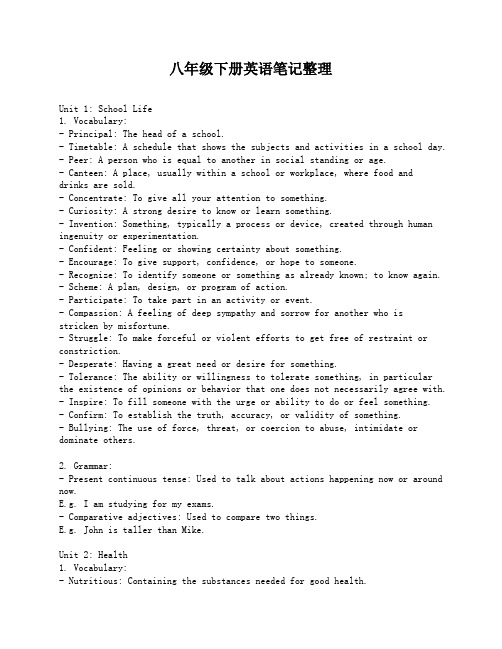
八年级下册英语笔记整理Unit 1: School Life1. Vocabulary:- Principal: The head of a school.- Timetable: A schedule that shows the subjects and activities in a school day. - Peer: A person who is equal to another in social standing or age.- Canteen: A place, usually within a school or workplace, where food anddrinks are sold.- Concentrate: To give all your attention to something.- Curiosity: A strong desire to know or learn something.- Invention: Something, typically a process or device, created through human ingenuity or experimentation.- Confident: Feeling or showing certainty about something.- Encourage: To give support, confidence, or hope to someone.- Recognize: To identify someone or something as already known; to know again. - Scheme: A plan, design, or program of action.- Participate: To take part in an activity or event.- Compassion: A feeling of deep sympathy and sorrow for another who isstricken by misfortune.- Struggle: To make forceful or violent efforts to get free of restraint or constriction.- Desperate: Having a great need or desire for something.- Tolerance: The ability or willingness to tolerate something, in particular the existence of opinions or behavior that one does not necessarily agree with. - Inspire: To fill someone with the urge or ability to do or feel something.- Confirm: To establish the truth, accuracy, or validity of something.- Bullying: The use of force, threat, or coercion to abuse, intimidate or dominate others.2. Grammar:- Present continuous tense: Used to talk about actions happening now or around now.E.g. I am studying for my exams.- Comparative adjectives: Used to compare two things.E.g. John is taller than Mike.Unit 2: Health1. Vocabulary:- Nutritious: Containing the substances needed for good health.- Exercise: Physical activity that is planned, structured, and repetitive for the purpose of conditioning any part of the body.- Diet: The kinds of food that a person, animal, or community habitually eats. - Balanced: Equal amounts of different things.- Habit: A settled or regular tendency or practice.- Hygiene: Conditions or practices conducive to maintaining health and preventing disease, especially through cleanliness.- Benefit: An advantage or profit gained from something.- Energy: The strength and vitality required for sustained physical or mental activity.- Immune: Resistant to a particular infection or toxin owing to the presenceof specific antibodies or sensitized white blood cells.- Addiction: The fact or condition of being addicted to a particular substance, thing, or activity.- Temperature: The degree or intensity of heat present in a substance or object.- Symptom: A physical or mental feature that is regarded as indicating a condition of disease.- Treat: To give medical care or attention to; try to heal or cure.- Recover: To return to a normal state of health, mind, or strength.- Relief: A feeling of reassurance and relaxation following release from anxiety or distress.- Prevent: To keep something from happening or arising.- Stressed: Experiencing mental or emotional strain or tension.- Concentration: The action or power of focusing one's attention or mental effort.- Therapy: The treatment of disease or disorders, as by some remedial, rehabilitating or curative process.- Efficient: Achieving maximum productivity with minimum wasted effort or expense.2. Grammar:- Simple past tense: Used to talk about actions that happened in the past.E.g. She visited her grandparents last weekend.- Modal verbs: Used to express ability, possibility, permission, and obligation.E.g. I can swim.- Conditional sentences: Used to express a condition that must be met in order for something else to happen.E.g. If it rains, we will stay indoors.Unit 3: Leisure Time1. Vocabulary:- Hobby: An activity done regularly in one's leisure time for pleasure.- Aim: The purpose or intention of doing something.- Leisure: Time when one is not working or occupied; free time.- Passion: A strong liking or desire for something or someone.- Favourite: Preferred before all others of the same kind.- Expert: A person who has a comprehensive and authoritative knowledge of or skill in a particular area.- Fascinate: To draw irresistibly the attention and interest of (someone).- Skill: The ability to do something well.- Enthusiasm: Intense and eager enjoyment, interest, or approval.- Talent: Natural aptitude or skill.- Creative: Relating to or involving the imagination or original ideas.- Relax: To make or become less tense or anxious.- Stress: A state of mental or emotional strain or tension resulting from adverse or demanding circumstances.- Achievement: A thing done successfully with effort, skill, or courage.- Communication: The imparting or exchanging of information or news.- Strategy: A plan of action designed to achieve a long-term or overall aim. - Cooperation: The process of working together to the same end.- Concentrate: To give all one's attention to a particular object or activity. - Confidence: The feeling or belief that one can have faith in or rely on someone or something.2. Grammar:- Present simple tense: Used for activities which are true at all times.E.g. She goes to the gym every day.- Adverbs of frequency: Used to indicate how often an action takes place.E.g. He usually plays football on Sundays.Unit 4: Friendship1. Vocabulary:- Confide: To trust someone with private or secret information.- Supportive: Providing encouragement or emotional help.- Loyal: Giving or showing firm and constant support or allegiance.- Respect: A feeling of deep admiration for someone or something elicited by their abilities, qualities, or achievements.- Trustworthy: Able to be relied on as honest or truthful.- Solve: To find a solution, explanation, or answer for.- Apology: A regretful acknowledgement of an offense or failure.- Forgiveness: The action or process of forgiving or being forgiven.- Sympathetic: Feeling, showing, or expressing sympathy.- Cheerful: Noticeably happy and optimistic.- Generous: Showing a readiness to give more of something, as money or time, than is strictly necessary or expected.- Jealous: Feeling or showing envy of someone or their achievements and advantages.- Gossip: Casual or unconstrained conversation or reports about other people, typically involving details which are not confirmed as true.- Honest: Free of deceit; truthful and sincere.- Disappointed: Sad or displeased because someone or something has failed to fulfill one's hopes or expectations.- Reliable: Consistently good in quality or performance; able to be trusted. - Encourage: To give support, confidence, or hope to someone.- Inspire: To fill someone with the urge or ability to do or feel something. - Admire: To regard with respect or warm approval.2. Grammar:- Present perfect tense: Used to talk about actions that started in the past and continue up to the present.E.g. I have lived in this city for 10 years.- Prepositions: Used to show the relationship between a noun (or pronoun) and another word in the sentence.E.g. I went to the park with my friends.。
人教版英语八年级下册1--5单元复习提纲
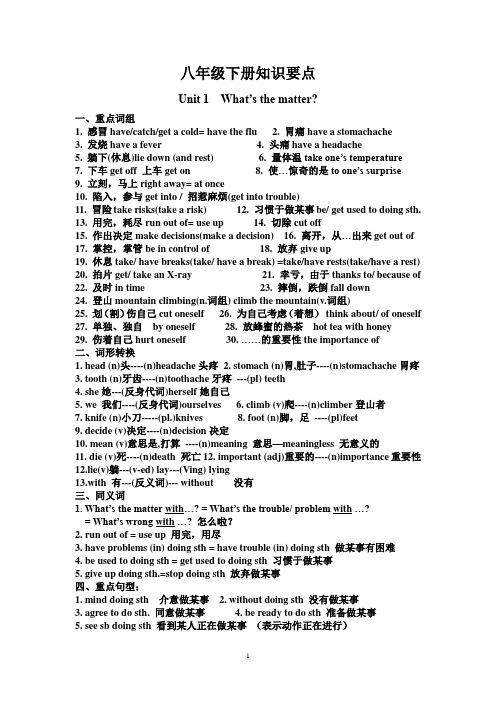
八年级下册知识要点Unit 1 What’s the matter?一、重点词组1. 感冒have/catch/get a cold= have the flu2. 胃痛have a stomachache3. 发烧have a fever4. 头痛have a headache5. 躺下(休息)lie down (and rest)6. 量体温take one’s temperature7. 下车get off 上车get on 8. 使…惊奇的是to one’s surprise9. 立刻,马上right away= at once10. 陷入,参与get into / 招惹麻烦(get into trouble)11. 冒险take risks(take a risk) 12. 习惯于做某事be/ get used to doing sth.13. 用完,耗尽run out of= use up 14. 切除cut off15. 作出决定make decisions(make a decision) 16. 离开,从…出来get out of 17. 掌控,掌管be in control of 18. 放弃give up19. 休息take/ have breaks(take/ have a break) =take/have rests(take/have a rest)20. 拍片get/ take an X-ray 21. 幸亏,由于thanks to/ because of 22. 及时in time 23. 摔倒,跌倒fall down24. 登山mountain climbing(n.词组) climb the mountain(v.词组)25. 划(割)伤自己cut oneself 26. 为自己考虑(着想)think about/ of oneself 27. 单独、独自by oneself 28. 放蜂蜜的热茶hot tea with honey29. 伤着自己hurt oneself 30. ……的重要性the importance of二、词形转换1. head (n)头----(n)headache头疼2. stomach (n)胃,肚子----(n)stomachache胃疼3. tooth (n)牙齿----(n)toothache牙疼---(pl) teeth4. she她---(反身代词)herself她自己5. we 我们----(反身代词)ourselves6. climb (v)爬----(n)climber登山者7. knife (n)小刀-----(pl.)knives 8. foot (n)脚,足----(pl)feet9. decide (v)决定----(n)decision决定10. mean (v)意思是,打算----(n)meaning 意思—meaningless 无意义的11. die (v)死----(n)death 死亡12. important (adj)重要的----(n)importance重要性12.lie(v)躺---(v-ed) lay---(Ving) lying13.with 有---(反义词)--- without 没有三、同义词1. What’s the matter with…? = What’s the trouble/ problem with …?= What’s wrong with …? 怎么啦?2. run out of = use up 用完,用尽3. have problems (in) doing sth = have trouble (in) doing sth 做某事有困难4. be used to doing sth = get used to doing sth 习惯于做某事5. give up doing sth.=stop doing sth 放弃做某事四、重点句型:1. mind doing sth 介意做某事2. without doing sth 没有做某事3. agree to do sth. 同意做某事4. be ready to do sth 准备做某事5. see sb doing sth 看到某人正在做某事(表示动作正在进行)On my way to school, I saw a man lying in the street.6. tell sb. ( not ) to do sth. 告诉某人(不)做某事7. be interested in sth./ doing sth. 对某物/做某事感兴趣Eg: I’m interested in English/ studying English.8. keep on doing sth. 继续做某事9. so+ adj./adv+that 如此……以致于(结果状语从句)Eg: Yun nan is so nice that many visitors come here every year.so that 以便(目的状语从句)eg: We study hard so that we can find good jobs.10.--- What’s the matter with…? = What’s the trouble/ problem with …?= What’s wrong with …? 怎么啦?--- Sb. have/has…. What should sb. do?--- Sb. should / shouldn’t….11. 表同情:--- My mother was ill. --- I’m sorry to hear that.Unit 2 I will help to clean up the city parks.一、重点词组1. 打扫、清除clean up= clean out2. 使变得更高兴cheer up= make sb. happier/happy3. 分发give out=hand out4. 想出、提出come up with=think up5. 推迟put off (doing sth.)6. 打电话给call up= ring up7. 照顾、关爱care for= look after= take care of 9. 修理fix up=repair10. 参加…选拔try out 21. 空闲时间free time11. 赠送、捐赠give away 12.(外貌、行为)像take after13. 建立、设立set up 14. 残疾人disabled people15. 无家可归的人homeless people 16. 影响、有作用make a difference to sb. sth.17. 食品库food bank 18. 养老院old people’s home19. 理想的工作dream job(可数) 20. 满足感feeling of satisfaction二、词形转换1. feel (v) ---- (n)feeling感觉,感触2. satisfy (v)----(n)satisfaction满足,满意3. own (v)----(n)owner物主,所有者4. break(v)---(adj)broken破损的5. able(adj) ---(adj)disabled丧失能力的6. difficult (adj)--(n)difficulty困难,难题7. train (v)-----(n)training训练,培训8. excite (v) ----(adj)excited/exciting 兴奋的9. kind (adj)----(n)kindness仁慈,善良10. understand (v) ----(过去式)understood11. easy(adj)---(adv) easily 简单地三、同义词1. clean out = clean up打扫;清除2. come up with = think up 想出,提出3. give out = hand out分发;散发4. give away = give … to 赠送;捐赠5. difficulty = trouble / problem困难,难题6. clever = smart聪明的7. fix up = repair / mend修理;修补8. cheer sb up = make sb happier / happy 9. be similar to= be/ look like= take after 相像四、固定搭配1. put off doing sth 推迟做某事2. learn to do sth 学会做某事3. stop doing sth 停止做某事stop to do sth 停下来做某事4. volunteer to do sth志愿做某事5. a good way to do sth 一个做某事的好方法6. be worried about doing sth 为做某事而担心7. be able to do sth 能做某事be unable to do sth 不能做某事8. used to do sth. 曾经,过去常常做某事9. Thanks/ thank you for sth./ doing sth. 为……而感谢10. make it +adj for sb. to do sth. 使某人做某事成为……Eg: Studying hard makes it possible for you to achieve your dream.五、词义辨析1. alone 与lonely的区别alone (adj./adv.)=by oneself :“独自的(地),单独的(地)”. lonely (adj.) :“孤独的,寂寞的”(feel lonely)She lives alone, but she never feels lonely.2. a little , little; a few, few的用法1)few, a few 后接复数名词;little, a little后接不可数名词2) a few (一些,少数几个),a little (一点儿)表示肯定:few, little (几乎没有)表示否定。
八年级英语下期复习提纲
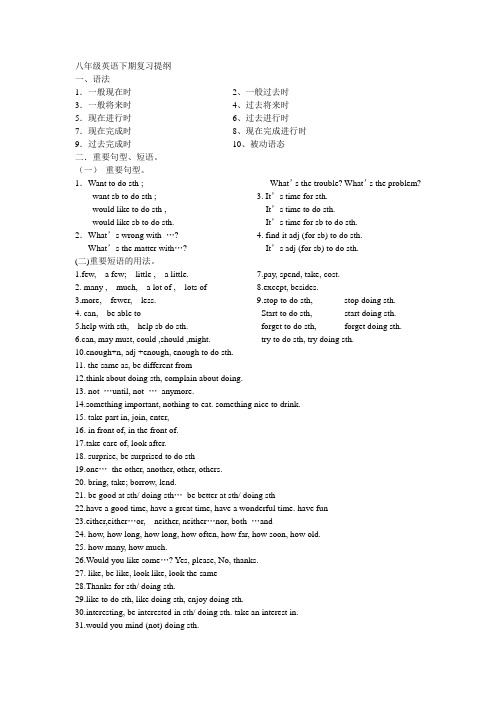
八年级英语下期复习提纲一、语法1.一般现在时2、一般过去时3.一般将来时4、过去将来时5.现在进行时6、过去进行时7.现在完成时8、现在完成进行时9.过去完成时10、被动语态二.重要句型、短语。
(一)重要句型。
1.Want to do sth ;want sb to do sth ;would like to do sth ,would like sb to do sth. 2.What’s wrong with …?What’s the matter with…?What’s the trouble? What’s the problem?3. It’s time for sth.It’s time to do sth.It’s time for sb to do sth.4. find it adj (for sb) to do sth.It’s adj (for sb) to do sth.(二)重要短语的用法。
1.few, a few; little , a little.2. many , much, a lot of , lots of3.more, fewer, less.4. can, be able to5.help with sth, help sb do sth.6.can, may must, could ,should ,might.7.pay, spend, take, cost.8.except, besides.9.stop to do sth, stop doing sth. Start to do sth, start doing sth. forget to do sth, forget doing sth. try to do sth, try doing sth.10.enough+n, adj +enough, enough to do sth.11. the same as, be different from12.think about doing sth, complain about doing.13. not …until, not …anymore.14.something important, nothing to eat. something nice to drink.15. take part in, join, enter,16. in front of, in the front of.17.take care of, look after.18. surprise, be surprised to do sth19.one…the other, another, other, others.20. bring, take; borrow, lend.21. be good at sth/ doing sth…be better at sth/ doing sth22.have a good time, have a great time, have a wonderful time. have fun23.either,either…or, neither, neither…nor, both …and24. how, how long, how long, how often, how far, how soon, how old.25. how many, how much.26.Would you like some…? Y es, please, No, thanks.27. like, be like, look like, look the same28.Thanks for sth/ doing sth.29.like to do sth, like doing sth, enjoy doing sth.30.interesting, be interested in sth/ doing sth. take an interest in.31.would you mind (not) doing sth.32. what about..? how about…?33. too…to so…that.34. have been to, have gone to. 固定搭配短语1.do the dishes2.sweep the floor3. make your bed4.fold your clothes5.at the end of6.write sb a letter7.call sb up8. fall in love with.9.argue with10.talk on the phone11. get on12.as soon as13. get out of14. go into15.walk down16.walk along17. walk around18.take off, land19.be mad at20. be angry with21. be supposed to do sth.22.be in good health23.send…to24.get over25.get mad at26.pass on27. agree with28.need to do sth.29 need to do sth30.between …and31. open up32. let sb in33.take …away34. go to college35. make money36. get an education.37.be free, be busy, be happy, be famous. 38.make a living39.at the doctor’s,40.out of style, in style.41.be from, come from42.be born in/ on43. as for.44. hang out45.take out46.hate to do sth.47.learn to do sth.48.travel around the world/travel all over the world49.in a minute/ right away/ at once50.happento51.all the time52.in the future.53.turn down54.pick up55. get sb sth.56.be friendly to sb57.decide to do sth58.for the first time59.study for…60. more than= over61. at least62. make friends with63.take a ride64.end up65. take a holidy66.all the year around。
八年级下册英语知识点复习提纲

【导语】学会整合知识点。
把需要学习的信息、掌握的知识分类,做成思维导图或知识点卡⽚,会让你的⼤脑、思维条理清醒,⽅便记忆、温习、掌握。
同时,要学会把新知识和已学知识联系起来,不断糅合、完善你的知识体系。
这样能够促进理解,加深记忆。
下⾯是⽆忧考为您整理的《⼋年级下册英语知识点复习提纲》,仅供⼤家参考。
【篇⼀】⼋年级下册英语知识点复习提纲Unit1【短语归纳】1.too much太多2.lie down躺下3.see a dentist看⽛医4.get an X-ray做个X光检查5.take one’s temperature量体温6.put some medicine on…在…上敷药7.have a fever发烧8.play computer games玩电脑游戏9.all weekend整个周末10.take breaks/take a break休息11 without thinking twice没多想12 go to doctor看医 13.get off下车14.take sb.to the hospital送某⼈去医院15.wait for等待16.to one’s surprise使…惊讶的;17.thanks to多亏;由于 18.in time及时19.think about考虑20.have a heart problem患有⼼脏病21.get to到达 22.right away⽴刻;马上23.get into trouble造成⿇烦(或烦恼)24.do the right thing做正确的事25.fall down摔倒 26.play soccer踢⾜球27.put…on sth.把…放在某物上28.a few⼏个;少数 e in进来30.get hit/sunburned被打击/晒伤31.be interested in对…感兴趣32.be used to习惯于 33.because of因为34.take risks/take a risk冒险35.lose one’s life失去⽣命36.run out(of)⽤完;耗尽37.cut off切除 38.get out of离开;从…出来39.make a decision/decisions做决定40.be in control of掌管;管理41.think about考虑 42.give up放弃43.go mountain climbing去爬⼭【⽤法集萃】1.need to do sth.需要去做某事2.see sb. Doing sth.看见某⼈正在做某事3.ask sb.sth.询问某⼈某事4.expect sb.(to)do sth.期望某⼈做某事5.agree to do sth.同意做某事6.help sb.(to)do sth.帮助某⼈做某事7.want to do sth.想要做某事8.tell sb. to do sth.告诉某⼈去做某事9.have problem(in)doing sth.10.be/get used to doing sth.习惯做某事e sth. to do sth.⽤某物去做某事12.seem to do sth.好像做某事13.keep on doing sth.继续做某事14.mind doing sth.介意做某事Unit2【短语归纳】1.clean up打扫(或清除)⼲净2.cheer up(使)变得⾼兴起来;振奋起来3.give out分发ed to曾经…;过去…5.give away赠送;捐赠6.set up建起;设⽴7.make a difference影响;有作⽤e up with想出 9.put off推迟10.put up张贴 11.call up打电话给12.help out帮助…摆脱困难13.care for照顾;照看 14.give up放弃15.try out for参加选拔 e true实现17.run out of⽤光 18.take after与…相像19.fix up修理 20.be similar to与…相似【⽤法集萃】1.need to do sth.需要做某事2.make plans to do sth.制定计划做某事3.ask sb.(not)to do sth.要求某⼈不要做某事ed to do sth.过去常常做某事5.give up+时间+to do sth.放弃时间去做某事6.get a feeling of…有…感觉7.decide to do sth.决定做某事8.help sb.(to)do sth.帮助某⼈做某事9.make a difference to对…产⽣影响10.make it possible for sb.to do sth.使得做某事对某⼈来说是可能的Unit3【短语归纳】1.do the dishes洗餐具2.take out the rubbish倒垃圾3.go out出去4.stay out待在外⾯;不在家5.help out帮助完做某事6.at least⾄少7.throw down扔下 8.all the time频繁;反复9.in surprise惊讶地 10.as soon as⼀…就…11.spend…on…在…花费(⾦钱或时间)12.in oder to为了13.provide sth. for sb.向某⼈提供某物14.depend on依赖;信赖15.look after照顾;照看 16.get into进⼊17.keep it clean and tidy保持它⼲净和整洁18.take care of照顾 19.as a result结果【⽤法集萃】1.finish doing sth.做完某事2.want sb. to do sth.想要某⼈做某事3.try(not)to do sth.尽⼒(不)做某事4.let sb. do sth.让某⼈做某事5.spend…(in)doing sth.花费…做某事6.mind doing sth.介意做某事7.learn to do sth.学会做某事8.learn how to do sth.学会怎样做某事9.the+⽐较级,the+⽐较级越…,就越…Unit4【短语归纳】1.too much太多(修饰不可数名词)2.too many(修饰可数名词)3.hang out闲逛4.get into a fight争吵5.go to sleep去睡觉6.call sb.(up)给某⼈打电话7.be good at擅长 8.talk about谈论9.on the phone在电话中10.look through浏览;翻阅;仔细检查11.give back归还12.be angry with sb.⽣某⼈的⽓13.a big deal重要的事 14.no problem没问题15.work out解决;算出16.get on with sb.与某⼈和睦相处17.feel lonely感到孤独municate with sb.与某⼈交流19.in future今后;从今以后 20.next time下次21.make friends交朋友 22.be worried about担⼼23.be afraid of害怕… 24.in front of在…前⾯25.not…any more不再… 26.play sports做运动pete with sb.与某⼈竞争28.so much/many那么 29.have lessons上课30.go shopping去购物 31.cut out删除;删去32.a few⼏个;少数 33.all kinds of各种各样的pare…with…⽐较;对⽐35.agree with sb.同意某⼈(的想法)36.in one’s opinion依…看37.something quiet⼀些安静的事38.turn down调⼩【⽤法集萃】1.allow sb.to do sth.允许某⼈做某事2.Why don’t you do sth.你为什么不做某事呢?3.want to do sth.想要做某事4.find sb. doing sth.发现某⼈正在做某事5.tell sb.to do sth.告诉某⼈做某事6.refuse to do sth.拒绝做某事7.let sb.do sth让某⼈做某事8.offer to do sth.主动提出做某事9.mind sb.doing sth.介意某⼈做某事10.not…until…直到…才…11.want sb.to do sth.想要某⼈做某事12.It’s time for sth.该做某事了13.It’s+adj.+to do sth.做某事是…的14.keep on doing继续做15.What do you think of…?你认为…怎么样?Unit5【短语归纳】1.wait for等候2.look for寻找3.go off(闹钟)发出响声4.take a shower洗澡;淋浴5.pick up接电话6.make sure务必;确保7.have fun玩得开⼼ 8.fall asleep⼊睡;睡着9.die down逐渐变弱;逐渐消失10.wake up醒来;叫醒11.in a mess凌乱不堪;乱七⼋糟12.clean up打扫⼲净;整理13.in times of difficulty在困难时期14.take photos拍照;照相15.play the piano弹钢琴 16.turn on打开17.listen to the radio听收⾳机。
- 1、下载文档前请自行甄别文档内容的完整性,平台不提供额外的编辑、内容补充、找答案等附加服务。
- 2、"仅部分预览"的文档,不可在线预览部分如存在完整性等问题,可反馈申请退款(可完整预览的文档不适用该条件!)。
- 3、如文档侵犯您的权益,请联系客服反馈,我们会尽快为您处理(人工客服工作时间:9:00-18:30)。
初二下学期英语复习提纲1 、宾语从句:如果一个句子作为动词或介词的宾语,称为宾语从句。
(1)如果一个特殊疑问句作某个动词或介词的宾语,一定要用其陈述的语序。
如:they often ask him where he is from.. 不能说成:they often ask him where is he from.(2)某些特殊疑问句作宾语可以简写成“特殊疑问句+to do” 的形式。
例如:i am thinking about what to say < what i should say.> 我正在考虑我该说点儿什么。
练习:一,选择题;( )1,Thanks a lot for me about it.a. to tellb. tellc. tellingd. told( )2.Best wishes your birthday.a. forb. toc. ond. in( )3.In England, people usually call James Jim .a. shortlyb. for shortc. easyd. easily( )4. Mother with her three children going shopping.a. areb. isc. willd. were( )5. March 8 th isa. the women’s dayb. the woman’s dayc. women’s dayd.women’ day二,改错题:()1.Every here like English very much.( )2.Mr Wu is going to want me to give a talk.( )3.In E ngland, you never can’t put their family name first.( )4.I don’t know why do people call me Jim.( )5.I’d like to buy something for Mr Wu in teache r’s day.三、单项选择:()1.Best wishes teacher’s day.a. tob. forc. ofd. with( )2.Thank you for English fun.a. makeb. to make c .makes d. making( )3.In England , people never use the first name their family name.a.before.b.in front ofc.withd.after( )4.T he teacher didn’t teach us in the last lesson.a.new anything b,new something c.anything new d.something new ( )5.Everyone is here. nobody isa. not away b, away c. not out d. go( )6.His friends call Jim short.a. he, forb. him, forc. him, ind. her ,for( )7.Would you like to give us a ?a .talkingb .talk c. to talk d. talks( )e to my office after school, Tom. L et’s a talk about your lessons.a. haveb. having c to have d had( )9.----Hi, Tom. how is your father? -----oh,a. he is not tallb. he doesn’t feel wellc.he is oldd. he is a teacher( )10.David William Lewis is called when we meet him for the first time.a. Daveb. Davidc. Mr. Lewisd. Mr. Willian( )11.Rober Thomas Brown is my very good friend, so I usually call hima. Mr Brownb. Rober Brown c Bob d. Mr Robert( )12. something about your family, ok?a. Sayb. Tellc. Speakd. Talk( )13.You can call me Bob, you should never call me Mr Bob.a. but b .or c. and d./( )14.In China, the first name is name. T hat’s different English name.a .family, with b. given, from c. family, from d. given ,with( )15,I’m very glad the news.a. hearb. to hearc. listen d . listening( ) 16.What about to the great wall hotel ?a. gob. to goc. goesd. going2. 一般将来时: be going to 结构的用法:(1) 用be going to+ 动词原形表示” 将要发生的事情或主观上打算, 计划, 决定要做的事 . 其后的时间状语通常为表示短期或近期含义的短语或表示固定时间的从句 . 如:tomorrow morning,/tomorrow afternoon /tomorrow evening, next month /next week /next year /next Saturday, this week/year/afternoon/Saturday. 或者when you grow up---------? 等等(2) be going to 结构中,be 是助动词, 要按句中主语的人称和数的变化而变化 . 其后要接动词的原形 . 该句的否定式是在be 后面加not, 其疑问式将be 提到句首 . 如:She is going to help her mother clean the house this Sunday./We are going to watch TV tomorrow evening. /Are they going to have a sports meeting next month.? /There is going to be an English call tomorrow afternoon..(3), 在英语中, 表示位置转移的动词, 如:come, go, fly, drive, leave, stay, 等, 可用现在进行时表示按计划或安排即将发生的事, 不必用be going to结构 . 如:She is flying to Nanjing herself. 明天她一个人飞往南京 . Are you driving home ? 你开车回家吗?练习:单项选择题:()1.What are you going to do Friday evening ?a. inb. onc. at d of( )2.Do you have to do every day ?a. much workb. many workc. much worksd. many works( )3.What about meat for supper ?a. to buy someb. to buy anyc. buying somed. buying any( )4. Ann her hair this Saturday .a. washb. washesc. to washd. is going to wash( )5.My school is near. I like walking there.a. toob. quitec. quietd. so( )6. These new shoes are for .a.you and Ib.I and youc.you and med.me and you( )7. would you like boating ?a.gob.to goc.goingd.to go to( )8. Why not there by bus ?a.to gob.goesc. go d .going( )9. Are you free next Ssaturday ? .a.Sureb. I think so c .Nothing much d.Why( )10.Is Li Ming good singing ?a.atb.inc.ond. for( )11.I have some books .a. readb. readingc. to readd. to reading( )12.Are you going to stay at school on May day ? No, I’m not. .a. I’ m going to homeb. I’mc. I’m going homed. I go to home ( )13. Kate has good friends at school.a.a quite lot of b,quite a lot of c.quite a lot d.a quite of( )14. I t’s five miles the farm the bus stop .a .from , to b. to, from c. from , with d.from ,by( )15. Our teacher likes us English in the morning .a. to readb. readingc. readd. reads( )16.They are going to play football next Friday.a. onb. / c .in d .at( )17. L et’s now .a. going to the parkb. to play gamesc.are singingd.have a rest3 . 形容词的比较级和最高级的用法:(1) 表示两者之间的比较时用比较级,常用于“比较级+than ”结构。
